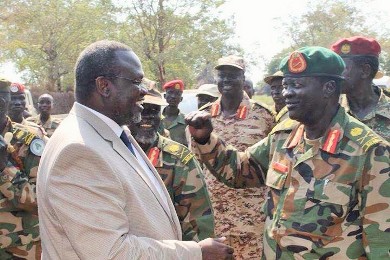South Sudan rebels deny trading federalism with positions
March 29, 2015 (ADDIS ABABA) – South Sudanese rebel faction of the Sudan Peoples’ Liberation Movement (SPLM-IO) led by former vice-president, Riek Machar, has dismissed as “false” allegations that the opposition group was ready to abandon their demand for federalism if given satisfactory positions in president Salva Kiir’s government.

It was also alleged that some of the reforms in various sectors would be forfeited for a while during a transition until after elections.
The government was also said to be ready to give the rebel leader Riek Machar the first deputy president’s position if he was willing to drop the other demands on governance and reforms and order his troops to lay down their arms for immediate reintegration into the national army loyal to the president.
But SPLM-IO has denied the allegations, saying they were false and meant to tarnish the image of the rebel movement.
“These allegations are false. We are not position seekers. We have a genuine cause for resisting the government and demanding for change,” Machar’s spokesman, James Gatdet Dak, told Sudan Tribune in reaction to the allegations on Sunday.
He said the SPLM-IO leadership had never asked for the position of the first vice president nor the other previously proposed position of the prime minister. All the proposals on the leadership structure, he said, came from the mediators to which the rebel movement had to respond.
“This is an attempt to tarnish our image. It is meant to try to distort our cause and portray us to the South Sudanese people and the international community as mere job seekers,” he added.
Dak said those who spread such allegations had short memory and should be reminded that the call for change was being championed before Machar lost his position as the vice president in government and vice chairman in the ruling party of the Sudan People’s Liberation Movement (SPLM).
“So there is nothing new or dreamlike in being a vice president in a country led by Salva Kiir,” he said.
The rebel leader’s spokesman further said in order to ensure that the country did not repeat the 15 December 2013 crisis, there was need for introduction and implementation of a better system of governance, federalism, which should be accompanied by overhauling reforms in the system.
Dak hinted that the rebel movement will not accept a meaningless peace agreement which will not address the root causes of the conflict or fall short of implementing federalism, sectorial reforms including transformation of the security sector.
He also reiterated the rebel movement maintained that president Kiir should step aside for “failing the country for 10 years, committing the genocide against a section of the society and dragging the country into the unnecessary civil war”, adding president Kiir did not fit to lead a transitional government.
The rebel group has been calling on the African Union (AU) to make public its report on the atrocities committed by the warring parties from 15 December 2013 when the crisis erupted, saying those responsible for gross human rights violations should be held accountable.
The two principal leaders, president Kiir and SPLM-IO chairman Machar in their latest face-to-face negotiations in Addis Ababa in early March failed to agree on almost every outstanding issue and did not revisit the leadership structure proposal that was composed of president, first vice president and vice president.
The rebel leader reportedly refused to discuss the leadership of the would-be transitional government of national unity, saying he wanted to first agree with president Kiir on other outstanding issues on governance, wealth-sharing, security arrangements, reforms and accountability and reconciliation.
Kiir also said he refused every demand presented to him by Machar.
The East African regional bloc of the Intergovernmental Authority on Development (IGAD), which sometimes proposes documents for negotiations and mediates between the two warring parties, said the talks would resume next month.
IGAD also seeks to expand the mediation body under a new mechanism to include countries of Troika (USA, UK and Norway), China, AU, European Union and the United Nations.
(ST)
